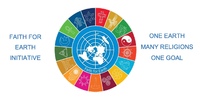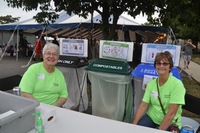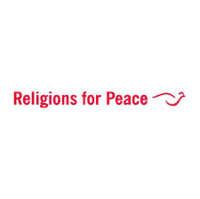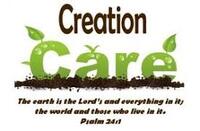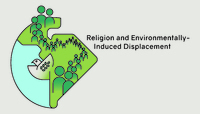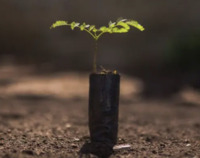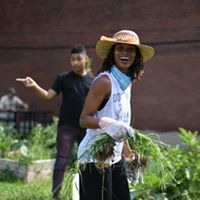Search
75 items
-
The Villa Farm
The Villa Maria, located in Villa Maria, Pennsylvania, describes itself on their website as the following: "Operating on 759 acres, the farm of Villa Maria Community Center is an integral part of the heritage of the Sisters of the Humility of Mary. The farm serves as a symbol of the struggle and sacrifice of a small group of women who settled on the Lawrence County land in 1864 and succeeded in establishing a viable, productive farm when others before them had failed. Land management at the farm is based on spirituality, sustainability, simplicity and the preservation of all local life systems." The greenhouse is open seasonally along with a produce market that sells the food grown. -
GreenSpot and St. Mary School
GreenSpot was founded in 2008 by former Columbus Mayor Michael Coleman as a place where people of the city can go to learn how to live, work, and commit to being green. Becoming certified as A GreenSpot is open to anyone from households, to businesses, to community groups. There are a list of commitments that must be made depending on the type of organization, but once they are met the application process can begin.
Recently, on January 30th, Columbus St. Mary School became a GreenSpot. The conversation first started in October of 2016 with Rebecca Mellino and the GreenSpot program. Between October of 2016 and January of 2017, members of GreenSpot, and Jerry Freewalt, head of the Catholic Creation Care team, came and spoke to the students about the program. Once the students became engaged and excited about the program, the school has had no difficulties keeping up with the responsibilities.
The students recycle and compost after breakfast and lunch. They rotate during recess and walk through the halls collecting the recyclables into bigger recycling bins. It is more than just the students that have gotten involved though. Teachers were given information on how to teach the different grade levels on how being green related to each of the students. Additionally, the staff members take turns delivering the recycled materials from the school to a drop off at Kroger about four times a week. Parents play an essential role as well, as they pitched in to buy small recycling bins for the classrooms and bigger bins for the cafeteria. The school also has plans to start a garden next to their building. Once it is built, they will have Boy Scouts, 4-H groups, and Night to Columbus to help care and maintain for the garden.
Christina Hickey is an art teacher at the school who is also in charge of marketing. She spearheaded the GreenSpot program and got staff members and students involved. The school’s student council is comprised of 4th through 8th graders that meet once or twice a month to talk and help out with recycling. Stepheny and Stephen are 6th grade student council members at St.Mary school who both recycle and compost at home. When interviewed, they both stated that they’re excited about the garden that is going to planted next to their school. Rose, a 4th grade student council member, was asked what it means to care for God’s creation and responded by saying “It’s really important. He made this for us. I don’t think we should trash it. I think we should cherish it.” Along with making the school a greener place, this program has made lasting impacts on students as well. Eayual, an 8th grade student council member that helps out every day stated that everyone should “think of the Earth as your life, take care of our life and don’t slowly destroy it.” He plans on attending Bishop Hartley high school where he aims to get students involved in recycling and caring for the Earth there as well.
Additionally, Christina Hickey who lead the GreenSpot initiative at St.Mary School can be reached at chickey@cdeducation.org for information on how to implement this program. To keep updated on St.Mary School and GreenSpot, follow their Twitter accounts at @stmaryschoolgv and @greenspotcbus. -
Engaged Organizations: Lakeside Chautauqua
Lakeside Chautauqua is a community in Ottawa County, Ohio that borders on part of the Chautauqua Trail along Lake Erie. This organization is dedicated to preserving Lakeside's heritage since it's inception in 1873. While fostering Christian values, Lakeside provides opportunities for various intellectual, physical, and cultural experiences. Also included are sub-organizations that, among other things, are dedicated to knowledge of the environment, sailing, wooden boats, and tennis. The Lakeside Environmental Stewardship Society (LESS) is a group that coordinates educational programs and field trips to raise environmental awareness. These community group leaders hope to increase awareness of the environment for Lakeside Chautauqua guests and residents, as well as foster increased environmental activism as people return to their homes after their visit. -
United Nations Environment Programme Faith for Earth Initiative
Launched in November of 2017, the UN Environment Faith for Earth Initiative recognizes the social, economic, moral, and environmental influence of faith communities, and established the initiative to "strategically engage with faith-based organizations and partner with them to collectively achieve the Sustainable Development Goals (SDGs)." As stated on the initiative's webpage: "Faith for Earth has three main goals: to inspire and empower faith organizations and their leaders to advocate for protecting the environment, to green faith-based organizations’ investments and assets to support the implementation of SDGs, and to provide them with knowledge and networks to enable their leaders to effectively communicate with decision-makers and the public." -
Congregational Profile: Our Lady of Perpetual Help, Grove City, OH: How it began in one parish
In 2016, prompted by Pope Francis’ encyclical “Laudato Si,” we at Our Lady of Perpetual Help Parish in Grove City, Ohio, held two 8-week sessions of discussions on the encyclical and at the end of the second session, our pastor, Fr. Daniel J. Millisor, appointed the discussion leader, Sister Nancy Miller, OSF as chairperson and called together a team to explore how the parish might lower our carbon footprint. The Creation Care Council (CCC) of our parish meets monthly for prayer, discussion and action in response to Laudato Si’s call for greater care for our common home.
We conducted a parish survey, with the intention of enhancing awareness among parishioners, as well as to determine if, and how, members were already incorporating recycling and composting into their daily lives. The results were highly, though not entirely, favorable. In addition to regularly inserting information and suggestions into our parish bulletins, taking the CCC members to tour a landfill, recycling plant, and the OSU Byrd Polar Research Center, we requested that all committees at the parish look at ways to reduce or eliminate their use of Styrofoam dinnerware. Rather than condemn polluters, we wrote thank you notes to businesses that showed environmental stewardship. We began annually purchasing and giving away seedling trees to plant on Earth Day. We took on trying to improve parish recycling efforts – providing new recycling containers for all parish offices, inviting a local official – an environmental expert – to explain to us what is and is not recyclable, preparing an interactive recycling quiz at the parish festival, and then attempting to bring recycling to the parish picnic and festival.
The efforts to incorporate recycling in parish events “failed” the first year, but we got it right the second year and this (the third) year, we successfully introduced food waste composting to Lenten Parish Fish Fry dinners, the Parish Picnic, and our largest parish event of the year: the Parish Festival. The 2019 Parish Festival served an estimated 5,000 meals, working with food vendors to increase their ability to serve compostable dishware and cutlery. In total, the CCC was able to divert 2,704 gallons of waste from the local landfill, which constituted 86% of all waste at the Festival.
We also exceeded all expectations in soliciting nearly 100 volunteers to help teach and monitor correct depositing of these materials - without tapping the usual volunteer corps that was still needed to keep the regular parts of the festival going. With the support of our pastor and dedicated CCC members, we’ve come a long way, and still feel like we have only just begun!
-
Engaged Organizations: St. Vincent de Paul School, Mt. Vernon, OH
Creation care work at St Vincent de Paul School, Mt. Vernon, began in 2006 when the school received funding from the Knights of Columbus to purchase a dishwasher for their kitchen. Following this, the school began participating in the Hope Now program – an organization that provides used old donated doors to build tables. The school provides transportation to their annual K-6 field trip to The Brown Family Environmental Center at Kenyon College and their annual 5th grade summer camp through Lutheran Outdoor Ministries in Ohio (students take turns weighing food waste). Additional sustainability projects include collaboration with the parish and the local community. The school participated in an all-parish project through the Green Tree Plastics company’s A Bench for Caps sustainability program (students collected and sorted bottle caps in exchange for three benches). The school plans to create a grotto area using their three recycled benches. In order to foster green living and healthy community-school relations, the school provided planter flowers to local businesses.
Administrators at St. Vincent de Paul acknowledge the importance of maintaining social justice programs in accordance with Laudato Si's urgent message to care for the poor. Students from Beth’s Robinson's 6th grade social studies classes participate in a demographics project. Each year students select one continent, usually Africa, to learn more about the conditions of poverty. The class then raises money through various fundraisers and donate to parts of the continent through Catholic Relief Services. An upcoming project includes having students sew plastic bags together to create tarps to be donated to homeless shelters in the area.
-
Engaged Organizations: Springs Dominican motherhouse, Columbus, OH
The Springs Dominican motherhouse hosts 150 individuals (maintaining 76 beds). Initial green projects included replacing their lights with LED bulbs and replacing seven boilers, which had been there since the 1940s, with just one new one. Recently, Innovative Organic Recycling composting company had been invited to speak with house members, and their composting program took off from there. Jean Sylvester, Motherhouse Administrator, had found it easy to do at her own house and was also aware of Shepherd’s Corner success with it. Both staff and residents adapted quickly and the process is streamlined at this point. Composting is done by the sisters themselves, with administration providing the bags and cans. In addition to composting food, even the bones, all of plates and cups, including coffee cups, can be composted as well.
For administration, this is a business model that makes practical sense. Management had been quoted at $35 per pick up, so they decided to give it a two-week trial period. Overall, composting has been a "win-win" for them, with its ease of implementation and minimal ongoing efforts. In addition, their dock smells better because the food waste bags are not left open in the dumpster now. There is also less garbage for RUMPKE to take, so the project cost savings of waste management will be reaped over time . -
Engaged Organizations: Shepherd's Corner, Blacklick, OH
In 1966, the Dominican Sisters of Peace had purchased 160 acres of land in Blacklick, Ohio, for what eventually evolved into the formation of various farms and ecology centers. Shepherd’s Corner is one part of this larger network. Srs. Rosie Ann Van Buren and Marguerite Chandler maintain their 1.5 acres well and use the area predominantly for educational purposes, with most food (usually 60-65% but more recently 80%) donated to local food pantries.
The following are some of the current activities and events that take place at Shepherd’s Corner: Sorting donated food from Fresh Market's food waste into compost or food to animals, Shepherd’s Fest, 5K – their main fundraiser, walking trails throughout the property, groups volunteering to garden, St. Charles high school students volunteering one Saturday per month, Meet the Animals, space rentals, school groups walk through the woods, small farm stand every Tuesday (run by Julie Laudick), slide show, calendar designed with a plan of action or set of events for each month. Srs. Rosie and Marguerite also monitor the water for Blacklick Creek, along with other individuals who are affiliated with county soil and water work.
Shepherd's Corner offers several group activities as well:
School groups and other youth groups, grades 3, 4, and 5 are invited to Shepherd’s Corner for educational programs. Cost per student is based on length of program and supplies needed.
Adult groups can enjoy the space for tranquility meditation, and prayer. Staff is available to give tours and lead sessions on special topics such as spirituality, universe story, nature and gardening. Fees are based on length of program and services provided.
They also offer use of our space to groups whose mission is compatible with ours. Please contact Miranda Land at scecologycenter@gmail.com regarding facility rental. -
Engaged Organizations: Catholic Diocese of Columbus, OH Development and Planning
Andrea Pannell, Episcopal Moderator for the Columbus Catholic Diocese, has been instrumental in the progress of creation care work within the office of development and planning. She views part of her job as to "plant seeds" whenever possible. The Bishop Pastoral Council, comprised of representatives from deaneries within the metro area, attend periodic meetings to address critical creation care issues. One project takes place at Andrea's own parish, St. Dominic’s Church, in the Mt. Vernon neighborhood of Columbus. They had maintained a vegetable garden to provide food for those in the area, some of whom rely on walking to get their groceries. The garden continues to be the only place for some locals to receive fresh food, as the area is considered to be a food desert. The development office was also key in linking the diocese's 150th anniversary and Laudato Si' with their tree planting initiative, as well as connecting the themes of the anniversary with salient points of Laudato Si'. Additional plans for further connections with development, planning and stewardship are still in the works.
-
Engaged Organizations: Stratford Ecological Center
The Stratford Ecological Center is an organic farm and nature preserve that provides education sessions, tours, and hiking trails to the public. They also offer various workshops and classes on an ongoing basis.
Trinity Catholic Elementary School 4th and 5th graders participation each year in a 5-day environmental camp "Messages of the Earth" at the Stratford Ecological Center. -
Engaged Organizations: Habitat for Humanity Restore
Habitat MidOhio Restores aims to reduce costs associated with affordable housing construction as well as reduce the amount of waste going into landfills. Restores accepts new or used household items and materials from individuals or businesses. The proceeds then assist with Habitat MidOhio's administrative costs in building affordable housing.
Recycling Inc. often donates there following their building deconstruction projects. -
Engaged Organizations: Green Tree Plastics - A Bench for Caps Program
Green Tree Plastics offers a children's program, ABC Cap and Lid program, for any children's organization. Children have the opportunity to collect, sort, and weigh caps and lids as part of their program contract. The children then receive a bench in which they are designated as the owner.
St. Vincent de Paul School in Mt. Vernon, Ohio has participated in the program and received three benches from students' effort with the program. -
Engaged Organizations: Web of Creation
The Web of Creation website discuss their organization aim and services that they provide:
"The Web of Creation was established to foster the movement for personal and social transformation to a just and sustainable world from religious perspectives. To that end, the information at this site will:
-Connect you with ideas, resources and strategies for doing eco-justice
-Inform, inspire, encourage, educate you about eco-justice
-Support you in your efforts to live, work and pray in ways that promote eco-justice
The Web of Creation has also been developed to provide information and connections for theology students interested in environmental ministry." -
The Little Minyan Kehilah/Sukkat Shalom
The Little Minyan is a Reconstructionist/Jewish Renewal congregation located in the Clintonville neighborhood of Columbus, Ohio. In this article, Rabbi Jessica K. Shimberg, the congregation’s spiritual leader, discusses the recent name change to Sukkat Shalom. She offers that the congregation has grown to the extent that they chose a new name that does not include the word "little" in it. The congregation is heavily involved in community outreach and provides an outlet for community service and spirituality. It is committed to sharing resources to help the planet. -
Earth Day Network
The Earth Day Network is an organization with a mission to diversify, educate, and activate the environmental movement. As they continue forward with their mission of building the world’s largest environmental movement, they recognize that faith leaders have been a driving force behind some of the most important social movements. They provide a plethora of resources to guide faith leaders and faith communities in their efforts of stewardship of the planet. -
Episcopal Diocese of Ohio: Bellwether Farm
Bellwether farm is a new camp and education center of the Episcopal Diocese of Ohio. It is meant to provide leadership development and teachings through sustainable farming, food production, and care of the environment. It is located in Wakeman Ohio, with the goals of informing, inspiring, and empowering leaders for a sustainable future. The buildings are models of green technology featuring passive buildings, renewable energy, and water reclamation systems. -
Global Faith Leaders Unite to Restore our Earth’s Balance
A campaign by Religions for Peace, worldwide religious leaders call on heads of state to respond urgently to the threats of climate change, commit to 100% renewable energy by 2050, and build a more flourishing, inclusive, and balanced world. Leaders of the Buddhist, Christian, Hindu, Indigenous, Islamic, Jain, Jewish, Shinto, Sikh, Taoist, and Zoroastrian faiths pledge to do their part by embracing the moral responsibility to care for our world. -
Engaged Organizations: Cincinnati Climate Change Task Force
In 2009, the Archdiocese of Cincinnati signed on to the St. Francis Pledge to Care for Creation. Since then, they have started their own Climate Change Task Force. This task force has adopted the mission of committing themselves to work towards a sustainable world based off of the responsibility to Care for God’s Creation. They work to implement the five pillars of the pledge: praying, learning, assessing, acting, and advocating for the environment and the poor. -
Creation Care Column
The Creation Care Column is a weekly column by Elliott Bush that is posted through St. Stephens Episcopal Church's (Columbus) website. Here Bush discusses current environmental events, tips for living a sustainable life, and much more all in the name of caring for God's creation. Bush also provides a wide array of environmental sources to allow readers to continue their education on their own. For example, in one of the most recent posts, Bush speaks about changes in plastic pollution efforts and encourages readers to check out Katherine Hayoe's weekly newsletter or Green America to find out more information. -
Faith for Earth Initiative
"Promoting faith leadership, faith-based organizations and communities as custodians of far-reaching, value-based perspectives on environmental sustainability.
Religion and spirituality hold tremendous wisdom for the protection and conservation of our earth, inspiring both religious and secular actors to advocate for stronger political will and lead by example. Find out why faith and environment matters.
A three-pronged approach drives this Initiative:
Strengthening partnership with faith-based organization’s leadership for policy impact;
Greening faith-based organization’s investments, operations and assets; and
Establishing an accessible knowledge-based support system using faith scripts and scientific evidence." -
Religion and Environmentally-Induced Displacement
The goal of this project is to enhance people's understanding of the religious response to environmental displacement in Latin America. This database includes a list of past workshops and public events related to the subject as well as relevant documentaries on the topic. -
Plant With Purpose
Plant With Purpose works to restore forests by planting trees in the most devastated and vulnerable parts of the world. They do this because they view the issues of global poverty and environmental damage as interconnected. -
A Jewish Response to Environmental Stewardship: LEEDing the Way
The article highlights Temple Israel of Minneapolis's achievement of LEED Gold Certification, reflecting their commitment to sustainability through a multi-year renovation project. This accomplishment aligns with their Jewish values, particularly the principle of Pikuach Nefesh, which emphasizes protecting life and the environment. The synagogue's efforts extend beyond their building to include community-wide initiatives such as climate action resource fairs and partnerships with environmental organizations. Their ongoing commitment to sustainability is showcased through continuous improvements and active participation in broader climate justice movements. -
Engaged Organizations: General Board of Global Ministries
General Board of Global Ministries discuss their vision and span of their work on their website. Their areas of impact run the gamut for a multitude of environmental and social justice issues:
"Connection is at the core of our work. Global Ministries connects The United Methodist Church, its people and congregations to partner with others engaged in God’s global work, which takes place in a variety of settings, countries and cultures.
Global Ministries works through missionaries and partners in more than 60 countries around the world. " -
Engaged Organizations: The Shalom Center
The Shalom Center discusses their three major program priorities on their website:
"(1) Addressing the Global Climate Crisis, especially drawing on Jewish and other religious teachings about shaping a sustainable society; coping with the problems created by unacccountable concentrations of corporate and government power in making change difficult; and working on these issues with special concern for those most vulnerable and most hurt as the climate crisis unfolds.
(2) Addressing unjust and destructive concentrations of political and economic power in the hyper-wealthy and in giant global corporations — power that corrupts democracy, including elections, and delivers enormous “benefits” to those who wield the power while depriving the poor, the aged, the sick, Black and Latino and Native communities, much of the middle class, and large numbers of women of ways to meet their individual and social needs.
(3) Peacemaking, especially among the Abrahamic communities both within the USA and in the broader Middle East, where violence is especially intense and where it engages intense emotions in the overlapping circles of the Jewish community, the other Abrahamic communities, and the American public generally."




